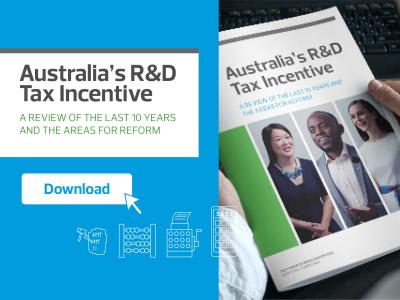Are you an inventive individual or a business proprietor who seeks innovation through research and development (R&D)?
Research and development (R&D) is a critical step in innovation, and the R&D Tax Incentive is a significant driver of innovation in Australia, encouraging companies to undertake R&D activities they might not otherwise be able to fund.
The Research and Development (R&D) Tax Incentive (RDTI) is a government-supported initiative that has the potential to provide your Australian enterprise with a cash rebate of up to 48.5%, aiding in the reduction of associated risks and expenses.
Many companies are unaware of the R&D incentive and the financial benefits it provides. Others simply do not have the in-house capabilities to make a claim.
This is where the Brisbane tax specialists at RSM can assist.
Eligible R&D entity
You can only claim the R&D tax incentive if you are an eligible R&D entity. You are an R&D entity if you are a corporation that is incorporated under any of the following:
- An Australian law
- A foreign law, but you are an Australian resident for income tax purposes
- A foreign law and you are both
- A resident of a country with which Australia has a double-tax agreement that includes a definition of ‘permanent establishment; and
- Carrying on business in Australia through a permanent establishment as defined in the double-tax agreement
- Eligible businesses can access either a refundable or non-refundable tax offset, with pre-revenue companies potentially receiving up to 48.5% cash back on qualifying R&D expenses.
- Whether you’re a startup seeking your first breakthrough or a large enterprise scaling innovation, the R&D Tax Incentive provides a tax-efficient pathway to growth. Gain the financial support, time, and resources your business needs to thrive in Queensland’s competitive innovation landscape.
DID YOU KNOW?
The size of the R&D offset is determined by the entity's aggregated turnover.
UNDER $20 MILLION AGGREGATED TURNOVER
Entitles the entity to a refundable R&D tax offset calculated as tax rate + 18.5%. This equals 43.5% for companies on a 25% corporate tax rate and 48.5% for companies on a 30% corporate tax rate. This means profitable entities are able to reduce the amount tax they pay and entities in a tax loss are entitled to a cash refund.
OVER $20 MILLION AGGREGATED TURNOVER
Entitles the entity to a non-refundable R&D tax offset that can reduce its tax liability or be carried forward to future periods. Depending on your ‘R&D intensity’, the incremental R&D benefit range from 8.5% to 16.5%.

Supporting R&D Activities
Background research and patent searches on the prior state of the art
Project meetings and core R&D activity management
Clinical site selection
Aspects of regulatory affairs
Engaging with key opinion leaders
Is your business missing out on grant opportunities?
Commonly asked Research and development tax questions:
Our tax advisors possess substantial expertise in effectively crafting applications and securing R&D incentives for endeavours aimed at acquiring new knowledge or information related to developing or improving products, devices, processes, or services. Here a few commonly asked questions to get you started:
Our R&D tax advisers can help you has extensive experience in successfully preparing applications and obtaining R&D benefits for activities undertaken to acquire new knowledge; or information in relation to new or improved materials, products, devices, processes or services.
If you are conducting R&D activities, you may be eligible to claim an R&D tax offset under the R&D tax incentive.
The R&D Tax Incentive is broad-based support across all industries, provided the relevant R&D eligibility criteria is met.
Some common industries that we see claiming the R&D incentive include Biotechnology, Technology / Software, Mining, Engineering, Manufacturing and Life Sciences.
You should assess whether you, and the activities you are conducting, qualify for a claim under the R&D tax incentive. To help you do this, we have set out the 6 steps you need to take to work out if you can claim and, if so, how much.
Some common industries that we see claiming the R&D incentive include Biotechnology, Technology / Software, Mining, Engineering, and Life Sciences.
The tax offset for eligible R&D conducted from 1 July 2021 is now based on a premium on top of your corporate tax rate.
Turnover of less than $20 million
For R&D entities with aggregated turnover of less than $20 million, the refundable R&D tax offset is your corporate tax rate plus an 18.5% premium.
Turnover of $20 million or more
For R&D entities with aggregated turnover of $20 million or more, the non-refundable R&D tax offset is your corporate tax rate plus an incremental premium.
The premium increments are based on your R&D Intensity. This is a percentage of your eligible R&D expenditure as proportion of your total expenditure for the year.
All eligible R&D expenditure up to 2% R&D intensity will receive a non-refundable R&D tax offset equal to your corporate tax rate plus 8.5% premium.
Additional eligible R&D expenditure above 2% R&D intensity will receive a non-refundable R&D tax offset of your corporate tax rate plus 16.5% premium.
Each R&D activity will have of one or more step that you must complete to achieve an activity outcome.
The program supports R&D activities that can be shown to meet specific legislative criteria. These activities must meet the requirements set out in the definitions of an eligible core or supporting R&D activity.
The definition of an eligible R&D activity under the R&DTI
Eligible R&D activities are defined in the legislation that underpins the program. Division 355 of the Income Tax Assessment Act 1997 identifies eligible activities as either core R&D activities or supporting R&D activities.
Core R&D activities
Core R&D activities are experimental activities:
- Whose outcome cannot be known or determined in advance on the basis of current knowledge, information or experience, but can only be determined by applying a systematic progression of work that:
- is based on principles of established science; and
- proceeds from hypothesis to experiment, observation and evaluation, and leads to logical conclusions; and
- That are conducted for the purpose of generating new knowledge (including new knowledge in the form of new or improved materials, products, devices, processes or services).
Supporting R&D activities
Supporting R&D activities are activities directly related to* core R&D activities.
The tax offset for eligible R&D conducted from 1 July 2021 is now based on a premium on top of your corporate tax rate. The R&D tax credit is between 18.5% to 43.5%, depending on your turnover as outlined below.
Therefore, if you were to spend $100,000 on developing a new product, you could get back between $18,500 and $43,500 depending on the company revenue and profitability.
Aggregated turnover of less than $20 million
For R&D entities with aggregated turnover of less than $20 million, the refundable R&D tax offset is your corporate tax rate plus an 18.5% premium.
Aggregated turnover of $20 million or more
For R&D entities with aggregated turnover of $20 million or more, the non-refundable R&D tax offset is your corporate tax rate plus an incremental premium.
The premium increments are based on your R&D Intensity. This is a percentage of your eligible R&D expenditure as proportion of your total expenditure for the year.
All eligible R&D expenditure up to 2% R&D Intensity will receive a non-refundable R&D tax offset equal to your corporate tax rate plus 8.5% premium.
Additional eligible R&D expenditure above 2% R&D Intensity will receive a non-refundable R&D tax offset of your corporate tax rate plus 16.5% premium.
Get in touch with a Research and Development Tax Incentive expert
Meet your local R&D tax expert
Larissa Lai

Larissa Lai is a Partner in the Brisbane R&D Tax division, with over 12 years of experience helping businesses—from start-ups to large corporates—access and maximise Australia’s R&D Tax Incentive.
She provides strategic, tailored advice on eligible R&D activities, funding options, and compliance, supporting clients through every stage of innovation, from early development to commercialisation or acquisition. Larissa has successfully represented clients during ATO and AusIndustry reviews and is known for her client-centric approach and deep technical expertise. Beyond work, she is an avid adventurer who finds inspiration in nature and the outdoors. Get in touch with Larissa >>
Caitlin Emery

Caitlin Emery is a Senior Manager in the Brisbane R&D Tax division, with over six years of experience helping businesses—from early-stage start-ups to established enterprises—access and optimise Australia’s R&D Tax Incentive.
She provides clear, practical guidance on program eligibility, decision rationale, and compliance, while supporting clients with education and process improvements for future claims. Caitlin is passionate about hearing the diverse R&D stories emerging from Brisbane and across the country.
Caitlyn Kranz

Caitlyn Kranz is a Manager in the Brisbane R&D Tax team, assisting businesses across a wide range of industries to access the Australian R&D Tax Incentive.
With over 4 years of experience in R&D advisory, Caitlyn works closely with her clients to identify eligible R&D activities, undertake eligible expenditure calculations, and navigate the complexities of tax compliance. Her expertise spans from early-stage development through to commercialisation, having worked with start-ups through to multinational corporations in claiming the R&D tax incentive.




